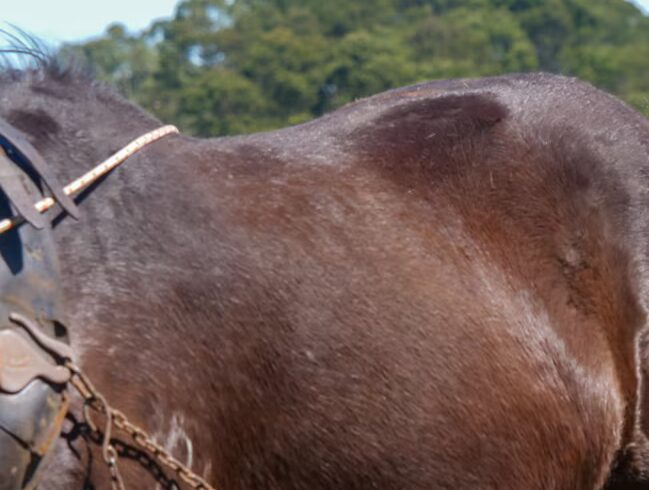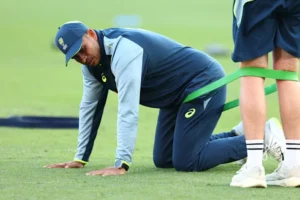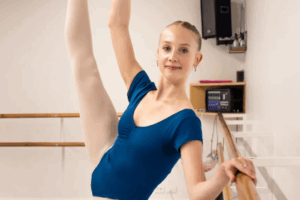
Sitting on a rusty horse-drawn scarifier, Aleks Berzins is farming the land in the same way his grandfather did.
The 36-year-old, from Exeter in the NSW Southern Highlands, breeds Australian draught horses, using them in every part of his farming operations.
“We really like to keep it traditional,” Mr Berzins said.
“Everything from ploughing, harrowing paddocks, sowing, cutting hay and stripping-off a crop.”
Aleks Berzins owns more than 50 drought horses. (ABC News: Sarah Moss)
Mr Berzins said a part of the farm was prepared for cropping using a single furrow plough.
“We do a section of the farm every year and if the conditions are right, it’s a pretty nice, peaceful thing to do,” he said.
He said the horses enjoyed the farm work as much as he did.
“They are herd animals, they do like to work together, and they really enjoy what they’re doing,” he said.
Aleks Berzins says using the heavy horses is slower than modern machinery but has other benefits. (ABC News: Sarah Moss)
Mr Berzins said using heavy horses and antique equipment was not as quick as modern day farming practices but believed it had other benefits.
“The way the soil is turned over with horses in general is slower and I think it’s better for the soil,” he said.
“You’re using it more in an organic way, turning [the soil] over with a moldboard plough or scarifying the paddock to knock the weeds.”
Inspired by childhood memories
Mr Berzins said working with a team of horses involved time and patience.
“They’re not like a tractor — you can’t just put a key in,” he said.
“When you’re working multiple, say a team of eight [horses], they’ve all got different personalities, so putting them in places where they are happy is important.”
Mr Berzins developed his interest in heavy horses by working with his grandfather, Sidney Samuels.
Aleks Berzins learnt about heavy horses from Sidney Samuel. (Supplied: Aleks Berzins)
“It’s nice to go out and plough a paddock that I remember him ploughing and it certainly keeps his memory alive,” he said.
Mr Berzins is one of the wagon drivers, known as teamsters, behind a record-breaking event that involved 62 heavy horses being harnessed to pull a wagon at Barellan in the NSW Riverina.
The record team of 62 horses pulls a wagon at Barellan. (Supplied: Kim Woods)
He trained 30 horses in the mega-team, controlling the lead horses using voice commands from the wagon.
“Following behind a small horse team on the farm is different to seeing 62 horses out in front of you,” Mr Berzins said.
“It’s something I will never forget … I’m proud of the horses and what they have achieved.”
Aleks Berzins begins preparing the horses for harness. (ABC News: Emily Doak)
Working with the heavy horses requires special equipment. (ABC News: Emily Doak)
A horse focuses on its work. (ABC News: Emily Doak)
When a hobby becomes a way of life
Another of the teamsters, Steve Johnson, also uses heavy horses on his farm near Lake Cargelligo in the Central West of NSW.
Steve Johnson began working with heavy horses 50 years ago. (ABC News: Stuart Carnegie)
“It started off as a bit of a hobby, then it became a passion, and now it’s a way of life,” Mr Johnson said.
He cuts his crop using a horse-drawn reaper-binder and stacks the sheaves into a haystack before making chaff using a horse-driven machine.
“There’s the whole cycle because the horses eat the chaff and then we start again the next season,” he said.
“It’s very time consuming … but if you were running a small place, I think it would be economical to have a couple of horses to do the work.”
Steve Johnson demonstrates using a horse-powered chaff cutter. (Supplied: Kim Woods)
Mr Johnson said he was motivated to produce crops in the old-fashioned way so he could work with his horses and share knowledge with the next generation.
“Not many people would know how to build a haystack, it’s a dying art and I’m hoping to pass that knowledge on to my grandson,” he said.
Steve Johnson says the horses are his mates. (ABC News: Stuart Carnegie)
Mr Johnson, who has been working with heavy horses for 50 years, said establishing a connection with the animals was key to training.
“I don’t even start training a horse until I can walk up and it’s happy to see me, I can put the feed in and it put its chin on me as if to say ‘thanks boss’,” he said.
“Then I know I’ve got a mate.”
Watch ABC TV’s Landline at 12:30pm AEST on Sunday or stream anytime on ABC iview.





